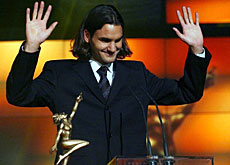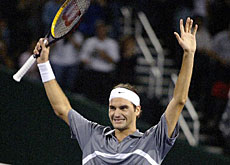Federer sets his sights on top ranking

Long-touted as the successor to Pete Sampras, Switzerland’s Roger Federer finally came of age in 2003.
Having taken home the Wimbledon and Masters Cup titles, the Basel-born player was also voted the “Swiss of the Year” at the SwissAwards ceremony on Saturday.
Federer has often fallen foul of commentators for not fulfilling his potential, but the 22-year-old answered his critics by rising up the ATP ranking to end the year second only to his American rival, Andy Roddick.
The highlight of his year came on the first Sunday of July, when Federer demolished the Australian player, Mark Philippoussis, in the centre-court final at Wimbledon.
Since then, he has not stopped wowing the world of professional tennis with the quality of his game – and his stamina.
Federer set a record in 2003 by winning 78 of the 95 matches he played, picking up seven titles along the way.
The Wimbledon champion took time out from his training schedule to tell swissinfo about the past year – and how he plans to build on his success in 2004.
swissinfo: It was a long time coming, but 2003 really turned out to be your year.
Roger Federer: Yes; all the elements came together this year. I had more time to prepare myself and I felt more physically strong. The past few years on the circuit also brought me more experience, which made a real difference.
swissinfo: Did the fact that you had already won the junior title at Wimbledon have anything to do with the way you set your sights on winning that tournament?
R.F.: Playing in a Grand Slam is always very motivating. But it’s true that Wimbledon is especially important to me, which always adds pressure.
This year, I arrived in Wimbledon in peak condition and with enough time to prepare, but you can never guarantee success. During the fourth round, I felt tremendous back pain and nearly pulled out of the tournament. But once I got over that, I began to play really well and managed to win.
swissinfo: By the time you got to the Masters Cup in Houston in November, you’d already played 90 matches. How did you manage to continue playing your best tennis?
R.F.: I was the first to be surprised by the quality of my game. I arrived in the United States tired, after playing a string of matches in October. My back was giving me trouble and nothing was going right during my training.
So to play like that throughout the week, particularly when you are up against the best players in the world, was terrific.
swissinfo: 2003 was an exceptional year for you, but do you have any regrets?
R.F.: Not many. It’s normal to lose from time to time. But three defeats in particular stay in my mind.
The first was at the French Open, when I lost against the Peruvian, Luis Horna. The second was against Lleyton Hewitt in the semi-final of the Davis Cup in Australia. But what really annoyed me was when I lost to Andy Roddick in Montreal. Had I won there, I would have been number one in the world. And to think that I was leading 4-2 in the third set…
swissinfo: You’re now something of a national hero, and a role model for young people. You’re also a key member of Switzerland’s Davis Cup team. Are you proud to be Swiss?
R.F.: Yes. Being picked as the fifth player in the Davis Cup team back in 1998 was a great honour for me. I felt right at home playing with people like Marc Rosset.
I really couldn’t wait to play for my country. My dream came true in 1999, when we played against Italy in Neuchâtel. That was a special moment, made more so when I won the first match. And still today, I really love this competition.
swissinfo: How are you preparing for 2004?
R.F.: The preparation is tough. Over the festive season, I worked on improving my physical condition and regularly spent four to five hours on court. These efforts will hopefully bear fruit in the coming months.
swissinfo: Presumably your top priority this year is to become number one in the world?
R.F.: Becoming the best player in the world is without doubt the biggest challenge. I’ll have the first opportunity to do so in January at the Australian Open.
But I’m also looking forward to other big moments in 2004 – in particular the Olympic Games in Athens and the four Grand Slams. Then of course there are the Swiss tournaments in Gstaad and Basel which I hope to win one day.
swissinfo: And the Davis Cup?
R.F.: That goes without saying, but it’s a shame that once again we’re going to have to start the competition away from home. I hope that we win the first round so that we can end up in a position to challenge our next opponents – maybe France – on Swiss soil.
swissinfo-interview: Raphael Donzel
Highlights of Federer’s 2003:
January: opens the season by reaching the quarter-finals of the Australian Open.
February: scores two points for Switzerland in the Davis Cup against the Netherlands; wins tournaments in Marseilles and Dubai.
April: notches up three points for Switzerland in the quarter-finals of the Davis Cup against France; wins the Munich tournament.
May: reaches finals of Masters Series in Rome; knocked out in first round of French Open.
July: wins his first Grand Slam at Wimbledon, but loses out in the final of the Gstaad Open to Czech rival Jiri Novak, who ends Federer’s run of 15 unbeaten matches.
August: reaches semi-finals of Masters Series in Montreal, but loses to David Nalbandian in the US Open quarter-finals.
October: reaches semi-finals of the Masters Series in Madrid; eliminated in second round of the Swiss Indoors tournament in Basel.
November: wins the Masters Cup with victories over Andre Agassi (twice), Andy Roddick and Juan Carlos Ferrero.
December: voted Swiss Sportsman of the Year at the Credit Suisse Sports Awards.
January 2004: voted “Swiss of the Year” at the SwissAward ceremony in Zurich.

In compliance with the JTI standards
More: SWI swissinfo.ch certified by the Journalism Trust Initiative


You can find an overview of ongoing debates with our journalists here. Please join us!
If you want to start a conversation about a topic raised in this article or want to report factual errors, email us at english@swissinfo.ch.